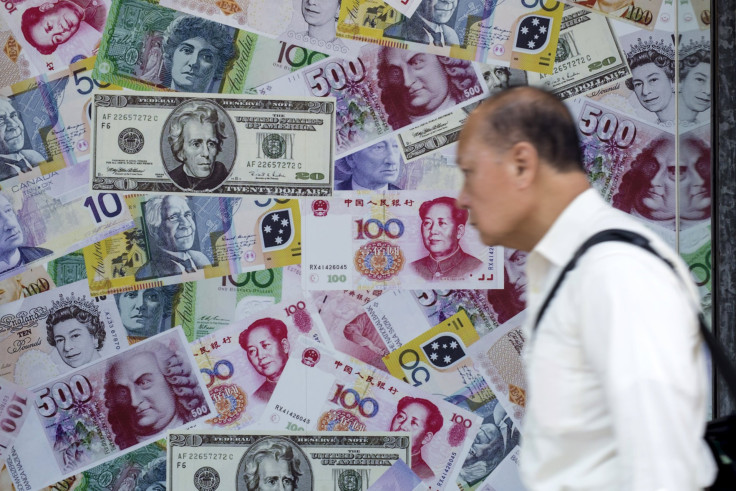From Luxury To Thrift: China's Black Monday Will Cast A Shadow Over European Economies, But They'll Survive

It’s about to get a lot more difficult to order a whisky on the rocks in China. As the Chinese stock market tumbled 8.5 percent overnight -- the biggest fall since 2007 -- global trading floors followed suit, wiping hundreds of billions off the world's financial markets. Fears of a major Chinese economic downturn have investors reeling, and for the average middle-class Chinese citizen, accustomed to luxury goods imported from Europe, this may mean bidding farewell to their aspirational lifestyle brands.
The world’s biggest market for alcohol is still China, but growth in this sector is now projected at 16 percent a year compared to the 21 percent from 2006 and 2011. Direct exports of Scotch whisky from the U.K. to China reached an all time high of more than $110 million in 2012, but this fell 23 percent by 2014.
The decrease was a result of the “pressure of Chinese government austerity measures and economic slowdown,” David Frost, Scotch Whisky Association chief executive said in a statement emailed to IBTimes. “We constantly monitor the current economic and financial situation in China and its potential impact on Scotch exports.”
Liquor companies aren't the only ones taking the hit. In the last decade, an increasing number of European countries geared their trade policies toward the Chinese market. The Chinese economy was growing and with it came a new interest in acquiring luxury items and building infrastructure -- machinery, automobiles and luxury goods -- that European manufacturers could capitalize on.
But a slowdown first became apparent three years ago when Chinese President Xi Jinping announced a campaign to curb government spending and corruption -- this meant a ban on foreign luxury cars, extravagant meals and gifts for government and army officials.
“China is importing less and it’s consuming less, so European companies that are in China or exporting to China are having harder times,” said Scott Kennedy, director of the Chinese Business and Political Economy Project at the Center for Strategic and International Studies. “It means that their anxieties about Chinese industrial policy are higher than they’ve ever been.”
This anxiety went into overdrive after the Chinese yuan fell by 3 percent this month, symptoms of a major Chinese slowdown and weakening economy that led to a global sale of stocks on Monday. Europe, which has not been without its own financial turmoil recently, is feeling the effects of a slower Chinese economy as investors lose confidence in China.
When markets closed in Europe on Monday, Germany’s DAX fell 3.27 percent, France’s CAC40 was down 3.2 percent and the FTSE100 decreased by 1.4 percent.
“When stock markets react this way, they read it as a sign that the whole world economy is slowing down, that makes them very nervous,” said Uri Dadush, a senior associate at the Carnegie Endowment for International Peace who focuses on in global economic trends. “We’re looking at a pretty protracted slowdown. It’s been going on for a while.”
Over the last year, China’s stock market increased at an unprecedented and unsustainable rate. In July China's Shanghai Composite began to decline and by last week, major global markets were following where China led.
But it's not all bad news. European companies are well-versed in China's economic shifts and, in the last five years, the EU has nearly doubled exports to China. As of 2014, China and the EU traded more than $1 billion every day.
Since January 2015, German automobile manufacturer Mercedes-Benz sold more than 190,000 vehicles in China, which represents a roughly 24 percent growth. The yuan’s devaluation did “slightly” affect the Daimler -- which owns Mercedes-Benz -- earnings but the company is confident that it will meet its goal of 300,000 vehicle sales this year.
“We are monitoring current developments in China very closely so that we can react appropriately if that becomes necessary,” a spokeswoman at Daimler told International Business Times. “We see good potential in China in the medium and long term.”
In the past decade, Germany’s exports to China increased by 200 percent, the majority of which were machinery and transport equipment and chemicals, but most European exports are still within the EU and to the U.S., where the weaker Euro makes European goods a bargain.
Though the yuan’s devaluation will decrease the price of Chinese goods, China manufactures in different sectors to the EU, so competition is unlikely.
“Even if China was put at a cost advantage it would take huge amount of times and resources if they were going to exploit that in new markets, or try to compete,” Smith said.
Meanwhile, thrifty Chinese Scotch drinkers may be turning to the bottle if global markets go deeper into the red.
© Copyright IBTimes 2024. All rights reserved.






















